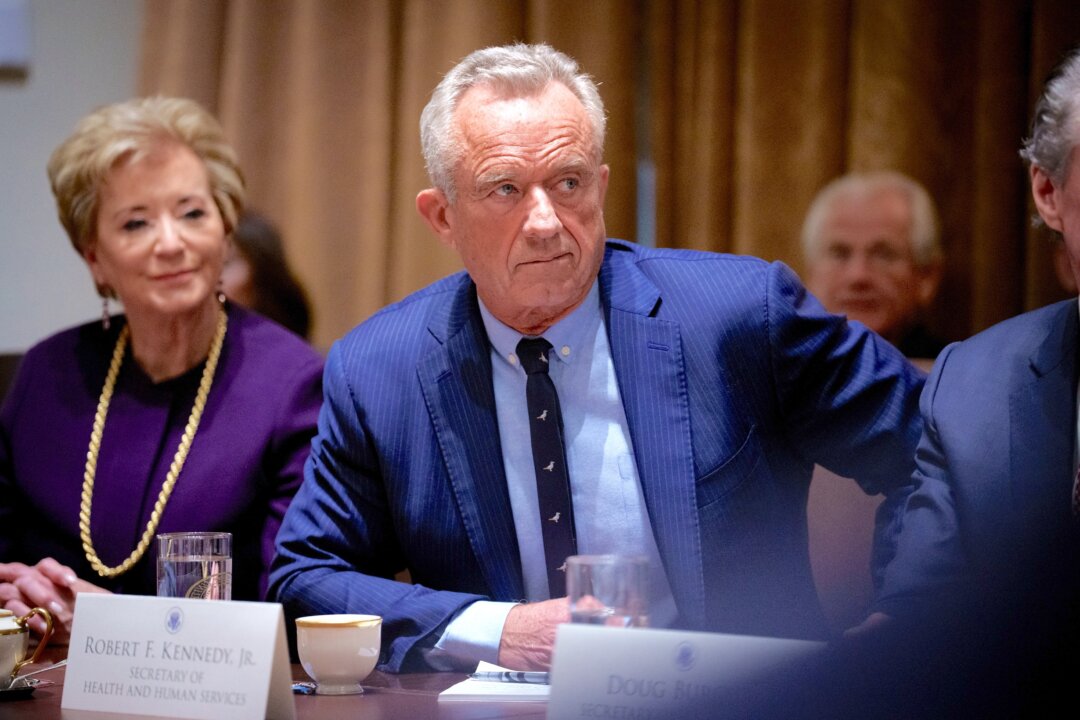Robert F. Kennedy Jr. disclosed details about his closed-door meeting with food company executives.
Health Secretary Robert F. Kennedy Jr. said in a new interview that he has given food company executives two years to remove Red 40 and other artificial dyes from their products.
“They said it’s going to take us a while. For example, the CEO of Pepsi, which owns Doritos, said … ‘The consumers like them to be very red, and we have not yet found a vegetable dye that we can match, but we’re going to do it.’ And I said they all have to be out within two years,” Kennedy said in the interview with CBS, which was released on April 9, disclosing details about the meeting for the first time.
The March 10 meeting involved executives from Kraft Heinz, General Mills, Tyson Foods, Kellogg’s, Smucker’s, and PepsiCo.
The Consumer Brands Association, a trade group representing PepsiCo and other food companies, also participated.
The association said after the meeting that Kennedy told makers the government wants companies to remove artificial dyes from foods.
“It went very well,” Kennedy said in the new interview. “I think they’re at the point where they see the writing on the wall.”
He said that the dyes are “clearly associated with a variety a grim inventory of diseases, including cancers and behavioral disease and neurological disease like ADHD, and it’s very, very well-documented and they’re making, in many cases, the same products in this country have those dyes, and then they use vegetable dyes in Canada, Mexico and Europe.”
Studies have linked artificial dyes with various neurobehavioral problems, the California Environmental Protection Agency’s Office of Environmental Health Hazard Assessment said in a 2021 report analyzing the research.
The Food and Drug Administration (FDA) in January banned Red No. 3, one of the dyes, from food products, noting studies that found rats exposed to high levels developed cancer, but said, “claims that the use of [the dye] in food and in ingested drugs puts people at risk are not supported by the available scientific information.”
After Kennedy became health secretary, West Virginia banned seven artificial dyes from food and drink products.
Kennedy said in the new interview that he held another meeting recently with Tyson Foods and that the company is down to one dye and is working on removing that.
A PepsiCo spokesperson previously told The Epoch Times in an email: “We appreciate the Secretary taking the time to sit down with us and view the meeting as a productive first step in working with the Administration. Together, we share a commitment to ensuring that America’s food system is the best in the world. We remain focused on providing consumers with convenient, affordable, and safe foods and drinks—including more options with natural ingredients, no synthetic colors and reductions in sugar, fat, and sodium.”
Tyson has not responded to requests for comment.
The discussion went over the “Make America Healthy Again agenda and working together to maintain consumer access to safe, affordable and convenient product choices,” Melissa Hockstad, president and CEO of the Consumer Brands Association, told The Epoch Times previously.
Kennedy also said in the new interview that the “biggest villain” for food safety, the Generally Recognized as Safe standard, is going to be eliminated, another way he’s carrying out the Make America Healthy Again vision.
Kennedy on March 10 directed the FDA to explore eliminating the rule, which lets companies include additives in foods without Food and Drug Administration review.
The rule was initially for traditional ingredients such as yeast but expanded to cover other ingredients.
“The FDA became captured by the food industry, and they enlarged the GRAS standard to apply to everything, and that’s why we have 10,000 ingredients in our food and the Europeans only have 400 in theirs,” Kennedy said. “Because in Europe, before you add something, a chemical, to a food, you got to prove that it’s safe. In our country, it is rubber-stamped.”

